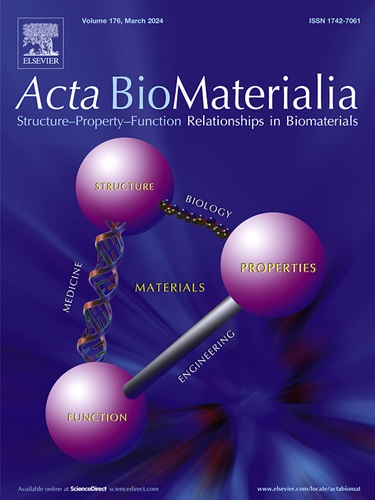基于生物活性肽的复合水凝胶治疗心肌梗死:清除ROS和血管生成调节。
IF 9.4
1区 医学
Q1 ENGINEERING, BIOMEDICAL
引用次数: 0
摘要
心肌梗死(MI)后,受影响的心肌区域处于缺血缺氧状态,随后心肌细胞发生一系列病理变化,最终转化为瘢痕组织。因此,恢复血液灌注和减少活性氧(ROS)对促进受损心肌的修复过程至关重要。本研究将在深海鱼类肌肉中具有良好抗氧化作用的MMP12 (YWDAW)肽和在哺乳动物内皮基因中具有促血管生成作用的KRX (MRPYDANKR)肽协同利用并加载到可注射的GelMA水凝胶中,以实现微创植入和心肌梗死部位的长期保留。生物活性肽的掺入构建了一个稳定高效的系统,在有效去除ROS和促进血管生成的同时,长期避免细胞凋亡和炎症,有效抑制心肌纤维化过程。体内和体外实验均表明,两种短肽联合抗氧化和血管生成治疗最终可实现受损心肌组织的快速修复。本研究充分证明了天然功能肽在促进梗死心脏修复和再生方面具有巨大的潜力。意义陈述:1;我们成功合成了天然来源的抗氧化肽和促血管生成肽。2. 设计一种注入生物活性肽的可注射水凝胶,有效清除活性氧,促进血管生成,促进心脏修复。3. 通过化学合成可获得一系列功能肽,为其大规模生产和在生物医学领域的广泛应用奠定了基础。本文章由计算机程序翻译,如有差异,请以英文原文为准。

Bioactive Peptide-Based Composite Hydrogel for Myocardial Infarction Treatment: ROS Scavenging and Angiogenesis Regulation
After myocardial infarction (MI), the affected area of the myocardium falls into a state of ischemia and hypoxia, and subsequently, cardiomyocytes undergo a series of pathological changes and eventually transform into scar tissue. Therefore, restoring blood perfusion and reducing reactive oxygen species (ROS) are essential to promote the repair process of damaged myocardium. Here, the MMP12 (YWDAW) peptide which has a good antioxidant effect in deep-sea fish muscle, and the KRX (MRPYDANKR) peptide which shows a pro-angiogenesis effect from mammalian endothelial genes, were utilized collaboratively and loaded into an injectable GelMA hydrogel to achieve minimally invasive implantation and long-term retention at the MI site. The incorporation of bioactive peptides builds a stable and efficient system, which in addition to effectively removing ROS and promoting angiogenesis, avoids cell apoptosis and inflammation in the long run, and effectively inhibits the process of myocardial fibrosis. Both in vivo and in vitro experiments have shown that the combination of two short peptides with anti-oxidation and angiogenesis therapy can eventually achieve rapid repair of damaged myocardial tissue. This study fully demonstrated that natural functional peptides have great potential in promoting the repair and regeneration of infarcted hearts.
Statement of Significance
We have successfully synthesized antioxidant and pro-angiogenic peptides, which were subsequently incorporated into an injectable hydrogel matrix. This bioactive hydrogel system demonstrates dual therapeutic functions, effectively scavenging ROS while promoting angiogenesis, thereby facilitating cardiac tissue repair. Notably, the chemical synthesis approach employed in peptide production establishes a robust foundation for scalable manufacturing and broad biomedical applications, particularly in cardiovascular therapeutics.
求助全文
通过发布文献求助,成功后即可免费获取论文全文。
去求助
来源期刊

Acta Biomaterialia
工程技术-材料科学:生物材料
CiteScore
16.80
自引率
3.10%
发文量
776
审稿时长
30 days
期刊介绍:
Acta Biomaterialia is a monthly peer-reviewed scientific journal published by Elsevier. The journal was established in January 2005. The editor-in-chief is W.R. Wagner (University of Pittsburgh). The journal covers research in biomaterials science, including the interrelationship of biomaterial structure and function from macroscale to nanoscale. Topical coverage includes biomedical and biocompatible materials.
 求助内容:
求助内容: 应助结果提醒方式:
应助结果提醒方式:


